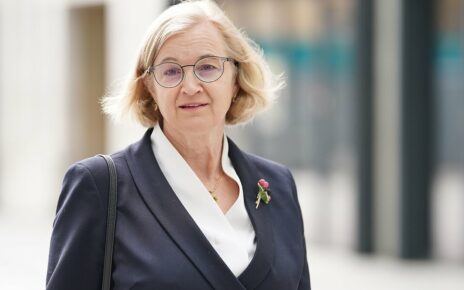Three siblings who were disinherited by their ‘illiterate’ painter father by mistake because he couldn’t understand his own will win share of his £700,000 fortune
- Kenneth Grizzle had cut out his children from his first marriage in his will
Three siblings mistakenly disinherited by their ‘illiterate’ painter father because he couldn’t understand his own will have won their court fight for a share of his £700,000 fortune.
‘Proud’ father Kenneth Grizzle had left nothing in his will for his three children from his first marriage, instead giving everything to his partner of 40 years, Theodora Richeford.
Hope Dillon, 65, Jo-Ann Morris, 62, and Leonard Grizzle, 64, claimed their father always struggled with reading, never read them bedtime stories as children and even dictated Christmas cards.
He had five children with two women – his wife Ena Grizzle and later Ms Richefond – but left his three kids on the Grizzle side of the family nothing in his will.
Instead, his estate, including the Grizzle family’s terraced Victorian home in Forest Gate, east London, went to former charity worker Ms Richefond when he died, aged 83, in 2019.
But the trio successfully sued, claiming their father must have disinherited them by mistake, because he always intended that their former family home in east London would be theirs.
Jo-Ann Morris, Leonard Grizzle and Hope Dillon outside the High Court after hearing in row over their father Kenneth Grizzle’s will
The Forest Gate house at the centre of court fight over the will. The Grizzle children will each get a slice of the £550,000 property alongside their two half-siblings
They have each been awarded a £110,000 slice of his of the Forest Gate home which they will share with half-siblings Lee and Kym Richeford.
Following a trial at the High Court, a judge ruled in the trio’s favour, finding that their father could not have understood he was cutting them out when he made the will in 2013.
Deputy Master Katherine MacQuail said that, although Mr Grizzle’s literacy had improved over the years, he could not without help have understood the effect of the will he signed.
She ordered that one clause of the will be torn up.
During the trial, the London court heard Mr Grizzle and his wife Ena were married in 1964 and had three children, buying their home in Sebert Road, Forest Gate, in 1967.
However, the relationship ended and he left the family home in 1974, before later meeting Theodora Richefond, now 73, and beginning a 40-year relationship with her.
Together, they had two children, Lee and Kym Richefond, and also brought up Theodora’s son Gary from a previous relationship, living at a house they bought in Stanley Road, East Ham, in 1992.
Mr Grizzle worked as a painter and decorator and continued to visit the Grizzle side of the family, never divorcing and still owning Sebert Road with his long separated wife.
In 2013, he made his final will, which handed Gary, Lee and Kym his share of Stanley Road, but granted Ms Richefond the right to stay there for the rest of her life.
Ms Richefond was to get the rest of his estate, which – because Ena crucially went on to die before him – included the Grizzle children’s family home in Sebert Road.
Mr Grizzle had a 40-year relationship with Theodora Richefond, 73 (pictured outside the High Court)
But challenging the will, the Grizzle children said their father had always wanted them to ultimately have the Sebert Road house, which was there to ‘look after’ them.
He must have believed that was the effect of his will, but was mistaken because he could not read well enough to understand its terms, they claimed.
Their barrister, Adrian Carr, said there had been no evidence put before the court to prove that Mr Grizzle could read and write, and therefore understand the terms of his will.
READ MORE: I changed my will to leave my son my $3 MILLION home – but he’s FURIOUS with me over the decision and is now refusing to care for me in my old age
Despite 500 pages of documents, not one showed his handwriting, he said.
His children said he had not read to them at bedtime and he had used another family member as his ‘secretary’ to help him with filling in forms, he said.
It meant he could not have read the 2013 will and understood that he might be disinheriting his three eldest children if Ena died before him. He had been completely reliant on what his will writer advised him.
Mr Carr said there was a ‘family understanding that Stanley Road was for the Richefond side of the family and Sebert Road was for the Grizzle side of the family’.
And in giving evidence, Jo-Ann Morris described the situation as ‘very very sad’, because she thought her father’s other family would stand by that ‘understanding’.
‘What I am disappointed about is Stanley Road doing what they’re doing when it was always clear in our family that Sebert Road would come to us once mum and dad had passed,’ she told the judge.
Mr Carr continued: ‘The deceased was not concerned because he always believed that as Sebert Road was jointly owned it would pass to Ena and when she died it would pass to the Grizzle children.
‘He was adamant that Sebert Road belonged to Ena and the Grizzle children.’
When he was reminded that his children with Mrs Richefond could make a claim against Sebert Road if their mother died first, he had become furious at the suggestion they ‘would do such a thing’.
Ultimately, their mum did die first, meaning her share of Sebert Road passed to Mr Grizzle under ‘survivorship’ rules and then to Ms Richefond under his will.
Defending the claim and also claiming themselves to prove the will, Theodora’s barrister Julia Beer insisted that, by the time he made the will, Mr Grizzle could read, having taken lessons in the 1990s.
She put before the judge text messages sent by Mr Grizzle and pointed out that he was able to read newspapers and pick which horses to bet on from the racing pages.
‘Any difficulty with reading or writing which may have existed in the 1970s was historic and…there is clear evidence of the deceased being able to read and to write from old text messages from 2009 and 2010,’ she said.
‘It is clear that this is not a case where the testator can be said to have been illiterate.’
She said the will was ‘perfectly rational’ and that the illiteracy allegation had been ‘born out of disappointment’ on the part of the Grizzles.
Mr Grizzle had two children with Ms Richefond (pictured). The Grizzle family’s terraced Victorian home in Forest Gate, east London, went to the former charity worker when he died
Ruling on the case, the judge said Mr Grizzle had been a ‘proud’ man with a ‘sharp mind and a good memory.’
‘Nothing I have heard enables me to conclude that Kenneth would, without assistance from somebody who understood the document themselves, be able to fully understand the will and its legal consequences,’ she said.
‘Kenneth was not a sophisticated reader and there is no evidence that he had any legal knowledge.’
She said the effect of her ruling was that the clause in his will leaving the residue of his estate – which included Sebert Road – was invalid.
Instead, he died partially intestate, meaning that the Sebert Road house would have to be shared five ways between the three Grizzle children, plus Lee and Kym.
The decision means each child is entitled to a £110,000 share of the house, which is said to be worth £550,000.
His half-share of the Stanley Road house still passes to the Richefond side of the family, with Theodora entitled to stay there for life.
Source: Read Full Article






